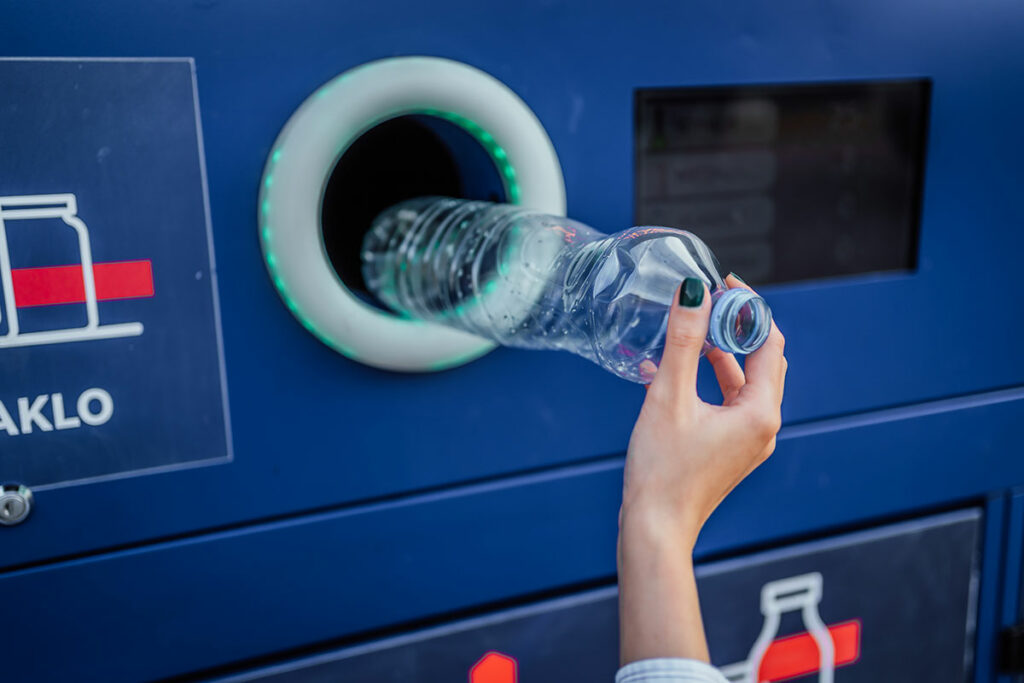In the midst of media buzz and a cacophony of opinions, one thing is clear: Ireland’s ‘Re-turn’ initiative has ignited something unlike anything seen since the dawn of the ‘Reduce, Reuse, Recycle’ era.
As we navigate through the waves of change, it’s easy to feel the ripples of resistance, but perhaps it’s time to shift our perspective.

The Irish government’s Deposit Re-turn Scheme might have initially stirred up a storm, challenging both households and businesses to reassess their habits. Yet, amidst the grumbles and the sighs, lies a golden opportunity to embrace a more sustainable future. Remember the days of discontent when wheelie bins lined our streets, or when the notion of a smoking ban felt like an infringement on our liberties? Change often meets resistance, but history has shown us time and time again that adaptation is not only possible but inevitable.
So here we stand, on the cusp of a new era in recycling. Let’s not view the Deposit Re-turn Scheme as a burden, but rather as a catalyst for transformation. In no time, what seems like an inconvenience today will become second nature tomorrow. Let’s rise to the occasion, Ireland. Let’s become the #RecyclingHeroes that our environment so desperately needs. Together, we can turn this challenge into an opportunity, paving the way for a greener, more sustainable tomorrow.
Re-Turn : The Deposit Return Scheme Explained
Gone are the days of simply tossing our plastic bottles and cans into the green bin. But fear not, because with Ireland’s innovative Re-turn scheme, recycling has never been easier or more rewarding!
Now, every time you purchase a drink packaged in plastic or cans ranging from 150ml to 3 Litres, you’re not just buying a beverage – you’re investing in the environment. With a small refundable deposit attached, you have the power to make a positive impact with every sip.
Returning your empties is a breeze. Simply rinse, dry, and drop them off at the nearest Re-turn outlet equipped with government-approved machines. Within seconds, you’ll receive a refund, redeemable for cash or as credit towards your next purchase.
Sure, it may require a bit of extra effort, but the rewards are worth it. With just a few simple steps, you’re not only reducing waste but also contributing to a cleaner, greener future for all.
- 15cent for bottles/cans from 150ml to 500ml
- 25cent for bottles/cans from 500ml to 3Litres
My organisation has a canteen that sells drinks. Are we required to participate in the Re-turn scheme?
Per DRS regulations all ‘retailers’ that sell in-scope products have a legal requirement to comply with the new Re-turn legislation.
For DRS purposes the definition of a Retailer includes traditional Retailers, HORECA establishments (Pubs, Restaurants, Hotels, Cafes etc.) Takeaways, Catering Companies, Event Venues.
This includes any business or organisation offering canteen, restaurant and/or vending machine services, either directly or through a third party, to their staff and visitors.
For more information on the Re-turn regulations and the requirements for retailers in this regard, click HERE.
Consumer and Business Buy In to the Deposit Return Scheme will help Strengthen the Circular Economy
Fully buying into the Deposit ‘Re-turn’ Scheme is just one clear way in which the Irish consumer and business communities can demonstrate their green credentials. By investing the money, time and pro-activity required to achieve ‘recycling excellence’, both members of Joe Public and business leaders alike can help support the government and environmental NGOs take recycling to the next level. By ensuring plastics and aluminium are properly recycled, we can help minimise the amount of non-compostable waste being generated.
Another key objective of the DRS is to act as mechanism to underpin and grow the Circular Economy, a sustainability-oriented model of green consumption at the heart of which is the principle of recycling, amongst other green-centric activities.
66%
Over Sixty-Six Per Cent of all General Waste Generated in Ireland Could Have Been Recycled
A core element of sustainability, recycling helps to protect the environment against the seemingly endless sprawl of landfill and safeguard our much diminished natural resources. A key feature of circular behaviour, active recycling helps to minimise our reliance on practices such as incineration and land-based waste disposal.
According to the findings of research carried out by the EPA, over 66% of all general household and commercial waste could and should have been recycled. The key question we need to ask ourselves is – why wasn’t it?
Even if we don’t want to adopt the practice of pro-active recycling – from recycling and repurposing our own gadgets, tools, clothes, utensils etc., it’s no great burden on us to separate our waste to ensure we use our green bins to the max. And, while we’re making that trip to our local electrical retailer to buy the latest ‘on trend’ device, why not take the time to drop off any old or broken electrical/electronic items marked WEEE including batteries, bulbs and vapes.

‘Re-turning’ the Environment Green - St. Patrick and Global Recycling Day
While it might seem like an insignificant move or token gesture by some, the overall impact of our combined effort to make the new DRS a success will be felt in terms of its positive contribution it can have on Ireland achieving its national sustainability goals.
Coming into effect at the beginning of February ahead of Global Recycling Day, the DRS has swung into action and already, most of us are returning our bottles and cans without quibble or quandary.
Launched six years ago in support of the UN’s Sustainable Development Goals, Global Recycling Day is marked annually on 18th March. This year, to celebrate those who have made significant contributions to the promotion and support of recycling – its benefits and relevance to a clean, green future – the theme of GRD is #RecyclingHeroes.
The fact that Global Recycling Day lands on the out-breath of ever-green St. Patrick’s Day isn’t lost on us. In the spirit of the week that is in it, when landmarks across the globe from the Statue of Liberty to the Sydney Opera House turn green, it is fitting that we should show our support for the UN-lead ‘global green agenda’.
Organisations Can Put Measures in Place to Help Protect the Environment
An EMS will Underpin Responsible Resource Management
In establishing a process-driven approach to managing waste that is focussed on achieving compliance with sustainability targets and regulations, at both EU and national level, ISO 14001 can assist organisations in achieving effective processes for green-centric practices such as recycling. In addition, an EMS – Environmental Management System – will not just streamline environmental operations, it will underpin responsible resource management, thereby ensuring improved performance and productivity, which in turn will deliver reduced overheads and effort.
Recycling at business level can be as simple as leveraging recycled materials such as paper and plastic or as advanced as implementing an EMS to mitigate waste risk and help conserve resources. Key to achieving both basic recycling practices or optimal waste management at an operational level is dissemination of data, facts and information. By educating on and generating awareness of the impacts – both positive and negative – of our actions on the community, environment and nature, we can encourage adoption of and buy in into sustainable best-practices.
By creating a greater understanding of just how critical recycling is to safeguarding the future of our planet combined with putting measures in place to supplement that awareness, we can help drive global adoption of sustainable best practices of which recycling is just one.
This year, why not green-up your corporate contribution to and involvement with Global Recycling Day. Let’s relish the chance to become green-centric #RecyclingHeroes, taking our cue from our reputation as the Emerald Isle of St. Patrick and giving our waste management and sustainability practices a touch of the shamrock.
For more information on ISO 14001 Environmental Management contact CG Business Consultings Sustainability Services Division on 01 – 620 4121 now.



